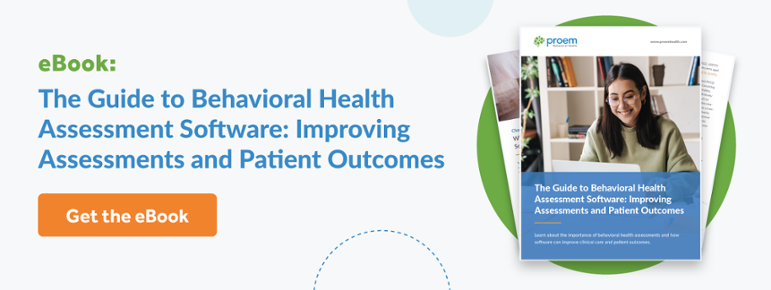Mental health clinicians need tools to help them deliver the best care to their patients. The right mental health assessment tools provide key information that helps clinicians diagnose disorders, make treatment plans and measure their patients’ progress. To save time, money, and frustration these tools must be accurate and easy to use. In addition, therapists, psychologists and other behavioral health providers need accurate data to make more informed treatment decisions.
Enter digital screening and assessment tools, which provide a solution to the problems of testing bias, unreliability, excessive expense and other challenges that can stand in the way of optimal patient care and financial viability for providers.
What Is Screening in Mental Health?
MedlinePlus provides us with a straightforward definition of mental health screening: It's an exam of one's emotional health. Screening tools help clinicians go deeper to help identify people who are at a high risk of having a specific disorder or condition. The tools do not provide a definitive diagnosis but may indicate the need for further evaluation. They may also be used to monitor progress, symptom changes and outcomes.
How Are Mental Health Assessments Different from Mental Health Screenings?
Assessments are more comprehensive than screenings and provide a greater detailed picture of multiple aspects of a patient’s mental health. Assessments can be used to identify disorders or conditions, measure their severity and guide clinicians in planning treatments.
The American Psychological Association emphasizes that both screening and assessment tools must meet certain criteria for reliability, validity, classification accuracy, fairness and norm adequacy. In addition, to follow best practices, assessments should be comprehensive, quick, DSM-5 compliant, digital, reimbursable and independent.
What Assessment Tools Are Used in Mental Health?
Assessment tools are available to identify and measure a wide range of mental health disorders and conditions. The Proem mental health screening tools list covers the most commonly diagnosed adult and pediatric DSM-5 disorders.
Here are three examples of commonly used mental health assessment tools, rating scales and screening instruments:
- Mini-International Neuropsychiatric Interview (M.I.N.I.) is a diagnostic tool used to assess 17 of the most common, major mental disorders in adults and 24 in children. It uses a branching-tree logic structure and takes about 15–25 minutes to administer.
- Yale–Brown Obsessive Compulsive Scale (YBOCS) is the most used rating scale for OCD. It rates the severity of symptoms on a scale that ranges from subclinical to extreme and provides separate ratings for obsessions and compulsions. Clinicians can use the YBOCS to select symptoms for treatment, measure patients’ progress and give patients more insight into their conditions.
- Body Dysmorphic Disorder Questionnaire (BDDQ) is a screening instrument that helps clinicians determine the likelihood that a patient has body dysmorphic disorder. The BDDQ contains nine questions and is highly sensitive and highly specific.
Benefits of Using Mental Health and Behavioral Health Assessment Software
Using software to assess mental and behavioral health offers numerous advantages over paper-based assessments. Let's look at some of the most significant benefits associated with mental health and behavioral health assessment software.
Greater accuracy
Administering manual, paper-based assessment tools can be a more subjective process than administering a digital test. With a manual tool, the assessor may introduce unconscious bias, and the manner in which an assessment is administered may be inconsistent from one assessor to another.
Digital mental health assessment tools eliminate the possibility of such bias and inconsistency. In addition, digital tools can more easily be kept current to reflect the latest understanding about effective diagnosis and treatment. Using manual tools that are outdated can cause an alarming rate of misdiagnoses.
Save time
Using digital mental health screening tools is quick and easy. It saves staff time that would otherwise have been spent administering in-person tests, allowing staff to be more productive. Patients save time when they don’t need to travel to the office to complete their screening.
The accuracy of these digital tools can also save significant time over the long run. By getting the diagnosis right the first time, the tools can save clinicians and patients the time and frustration of trying and abandoning numerous treatment regimens.
Save money
Assessment software can save behavioral health organizations and clinics money — and strengthen their bottom line — by:
- reducing the time clinicians and staff need to spend administering assessments;
- reducing costly errors in diagnoses; and
- gathering data that can help organizations and clinics operate more efficiently and provide care for more patients.
Measure progress and outcomes
The ease of administering mental health and behavioral health assessment software makes it practical to monitor progress and outcomes more closely and support efforts around measurement-based care. Clinicians can make better treatment decisions when they have more information about how patients are responding to their care, and they can more easily modify their treatment plans based on the feedback provided by the assessment software.
Make collaboration easier
When assessments are in digital form, it becomes easier and more efficient for primary and behavioral health teams to share information and collaborate on and better coordinate care. Treatment outcomes may be significantly improved when all aspects of a patient’s health are considered together and care coordination is improved.
Identify trends in mental health
Gaining access to detailed digital assessment information makes it easier to identify trends that affect groups of patients. Knowledge of such trends can direct clinicians to areas for research and improve evidence-based treatment practices.
Scale up
If an organization or clinic wants to grow its client base, the use of digital assessment tools can help create a greater capacity for taking on new patients. The ease and speed of these tools allow clinicians to efficiently scale up their use to serve a larger number of people.
Provide virtual care
Over the last few years, many patients experienced telehealth for the first time and were often pleasantly surprised by the experience. Many people have become accustomed to the time-saving convenience of using online interactions for many aspects of their life and are reluctant to give that up.
Using digital assessments instead of requiring patients to come into the office to complete assessments helps meet people’s expectations of the convenience of virtual care.
Reaping the Rewards of Mental Health and Behavioral Health Assessment Software
Would you like to learn more about how mental health and behavioral health assessment software can drive care to further improve your patients’ mental health? The evidence-based behavioral health workflow engine that powers the Proem solution can be used to assess multiple conditions and help providers to more accurately and efficiently screen, diagnose, treat and monitor their patients. Interested in seeing what Proem can do for you? Request a demo at Proem.com.















